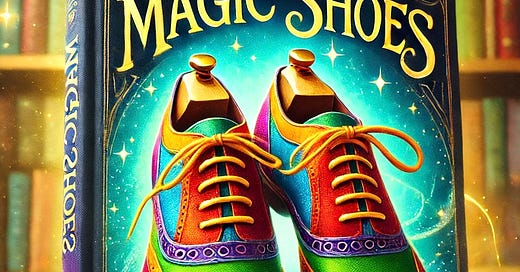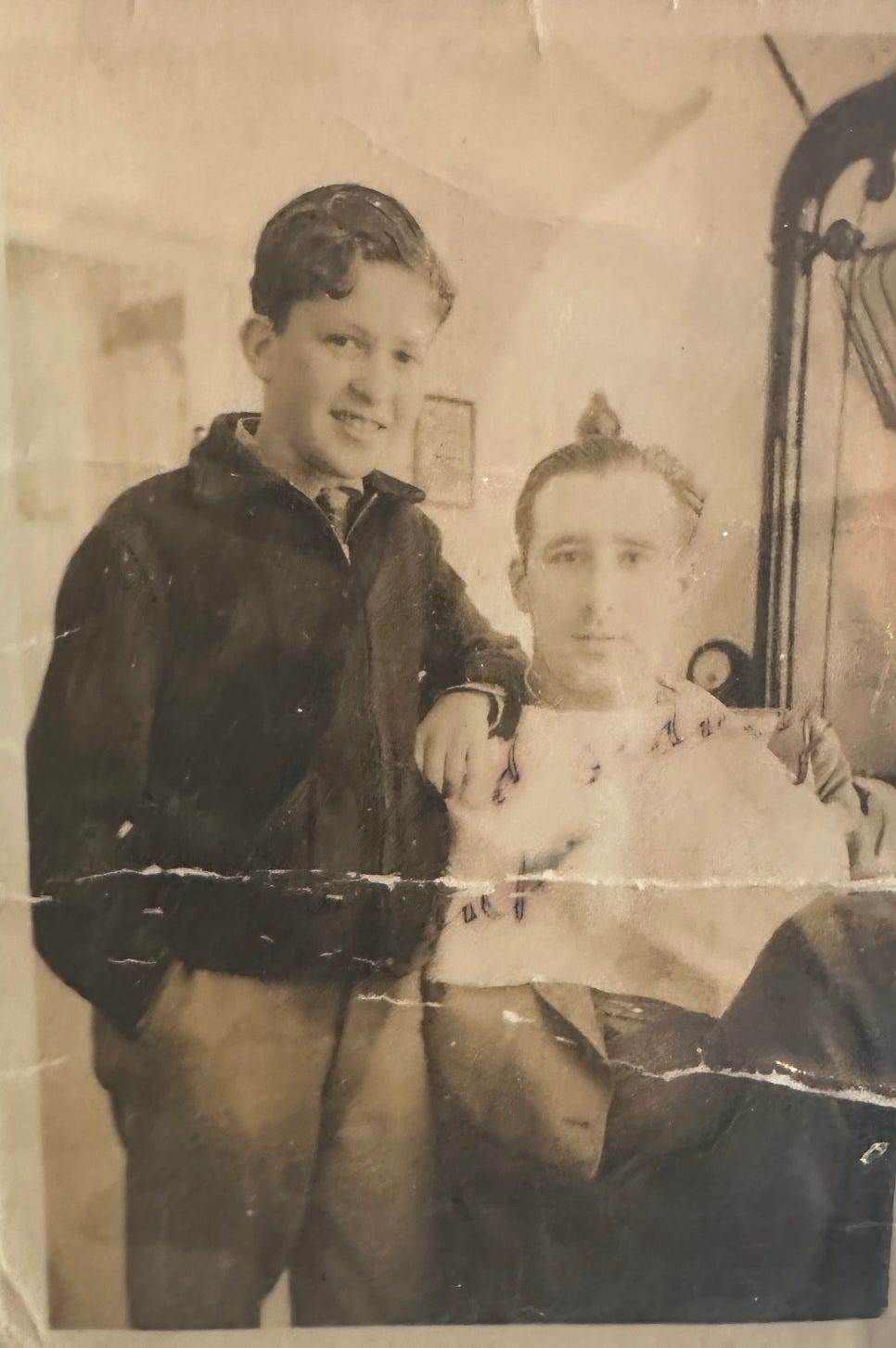“Oy vey, G-men,” says Henry, quickly reacting, as if having planned and rehearsed such a scenario. “Follow me,” he whispers, rushing silently to the far side of the office. There, he slides a wall panel, revealing a dark narrow passage, which I enter behind him. A short staircase leads to the building’s basement. He plucks from his pocket a small flashlight and leads me through a long dark corridor lined with old crates and rusting tools.
“Where are we?” I whisper.
“Bootleggers stored liquor here during Prohibition,” he whispers back. “Keep moving.”
The corridor leads to a narrow tunnel that was part of an old drainage system.
“Watch your step,” he cautions.
We navigate puddles and uneven stones as we carry on past damp walls.
About fifty yards later we arrive at a small iron gate. He shoves it aside and enters with me at his heels. We are in what looks to be an abandoned speakeasy. Then up a narrow flight of stairs into a diner.
A man behind the cash register nods, leans down, and hands him a brown paper bag.
“Wait here,” instructs Henry.
I watch him disappear into the lavatory. When my grandfather reappears a couple minutes later, I almost don’t recognize him in wire-rimmed glasses and a newsboy cap.
He gestures for me to rise and leads me out the door onto a crowded street, where he breathes a sigh of relief, relaxes his shoulders and slows his pace.
We approach Hester Street, a bustling artery in the heart of this mostly Jewish immigrant neighborhood. It is packed with stalls and street vendors, the sounds of bargaining fill the air. This makes it easy for my grandfather to get us lost in the crowd.
Henry ducks, with me right behind, into a small delicatessen. He knows the proprietor, who understands Henry’s need for protection, and sits us in a back booth, near a rear exit. My grandfather snuggles into this small booth with his back to the wall.
I sit facing him and look around this busy gathering place where everyone seems to know one another.
“The stress…” says Henry trailing off.
“I can only imagine,” I say.
My grandfather shakes his head. “War is coming. I see it. I smell it. And even though we—my family—even though we are an ocean away, I know my sons will be forced to join the mobilization and will be shipped across the ocean to war.
The proprietor sets before us two plates of pastrami on rye with mustard, a pickle on the side, and potato knishes. His eyes twinkle with pride.
“Nosh.” Henry gestures at the food.
Between the stress he must carry and this diet, I now understand why my grandfather died from a heart attack and died a few weeks after German troops marched into Poland in 1939. He was only 58.
I tuck in. The smoky moistness of very fatty pastrami satisfies my hunger and soothes my soul.
“My eldest son, Samuel—I named him after my father—is already of age. He’ll be the first to go.” Henry shakes his head sadly. “And my younger boys…”
The proprietor reappears with a large bottle of Cel-Rey soda and two glasses. My grandfather pours for us both, takes a gulp.
“Jackie and Sydney. They’re in their mid-teens and will be ripe for the plucking very soon.” He pauses and, again, shakes his head sadly. “Another generational purge, just like the war to end all wars.” He closes his eyes in contempt. When he reopens them they are focused on my facial features. “You must be Hannah’s son, no?”
“How did you know I’m your grandson?”
Henry considers this. “I don’t know. I mean, I know. But I don’t know how I know.”
I shake my head. “Not Aunt Hannah. My father was Sydney. But he changed his name to Ellis.”
Henry’s interest is deeply piqued. “After Ellis Island?” He takes a bite of his thick sandwich, chews, swallows.
“Maybe, I never asked. And it’s too late now. But you’re right, all three of your sons went to war.”
My grandfather slumps. “Don’t tell me.”
“It’s okay, all three came back, limbs intact.”
Henry shakes his head in disbelief and exhilaration. A tear forms in his left eye and he seems choked up. “Farklempt,” he explains.
“But you were right about wanting to get people out.”
My grandfather remains silent.
However bad Henry envisioned what would happen in a Second World War, he could never have imagined Auschwitz and Dachau. I did not wish to burden him with the horror his people faced before they perished. “But all four of your children lived into their eighties. And each had three children, and you have fourteen grandchildren.”
“How did you get here from another time and place?”
I look down and Henry’s eyes follow. “These shoes. They brought me here. They took me to other times and places too.”
My grandfather nods, absorbing this. He is silent for about twenty seconds. Then he finally speaks. “Mishegoss. But I believe you. Whatever those shoes are, wherever they take you, remember this: Every step matters. Every person you meet, every moment you live. They’ll leave marks on you. You’ll carry those marks with you when you return from your own time and place. Even here….” He pauses, his voice turning reverential. “Those shoes didn’t bring you just across time. They brought you into a story that’s bigger than both of us. If there’s a message I have for you, it is this: Do what you think is right, and don’t worry about it. Don’t worry about anything. I do what I think is right, but I always worry. I worry about everything, especially about my family.” He shakes his head sadly. “I worried myself into an early grave.”
When he says grave, I suddenly remember I visited his gravesite at a cemetery on Staten Island around 35 years ago. I phoned my father when I reached the site. His parents’ gravestones had been broken by vandals and the ground was covered with poison ivy. We paid to have them repaired. When I suggested that the poison ivy be cleared out, my father said, “No, leave it, the poison ivy will protect the new stones.”
Henry leans back in his chair, absorbed with self-examination. “When my only daughter, Hannah, drove across the country with a friend, I never stopped worrying. Two girls in their late teens! Days would go by and she did not call. I was certain she had met her end.”
I relate to this kind of anxiety. Now I know where I got it from.
Henry looks up, a big smile on his face. “Hey, look who’s here!”
I follow his gaze across the deli to two boys in their mid-teens. They had just entered, playfully shoving one another.
I feel a chill run through my body as I recognize… my dad.
At age 14.
He is wearing a Spencer jacket and baggy khaki trousers.
They grab a pair of stools at the deli counter where the older boy—my Uncle Jack—steals a pickle off the plate of an elderly man stooled next to him.
I’m in awe as I quietly watch. The counterman serves them a pair of chocolate egg creams in traditional soda glasses.
Watching my father joking around with his older brother, I recognize a habit of his I know so well. He brushes his hair back with his fingers, the same way he would as a man in his early thirties when I was a toddler.
As the elder in this surreal situation, I’d like to approach my father and speak with him. Henry reads this in my face. He reaches over places his right hand on mine, catches my eye and shakes his head. “He’s too young. It would confuse him.”
I’d just wanted to spend another few moments with my father. But I know Henry is right.
“He’s swell,” says Henry. “Last week at the barber shop he met Hank Greenberg—the real McCoy.”
“Hammerin’ Hank, the baseball hall of famer?”
Henry nods. “He got his picture taken with him.”
“I have that photograph!”
Although I can’t take my eyes off my father as a teen, I keep my distance. He and Jackie laugh gaily as they slurp their eggs creams, competing over who can slurp the loudest. There’s a warmth in his face, a kind of unguarded innocence. I yearn to reach out and reveal a hint of what his future would hold. I want to express my love for him, but Henry’s steady grip on my hand anchors me.
My mind begins to spin. Perhaps I’m overwhelmed by the poignancy of my situation. I close my eyes to quell the dizziness.
When I reopen them, I’m standing inside Colin Narbeth & Son, the numismatic shop on Cecil court.
“Bring back a memory?” asks the proprietor.
“Huh?”
He touches his cheek—and I realize I have a single tear sliding down my own.
I look down at the buffalo nickel still in my palm. “Yes. I’ll take it.”





